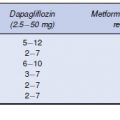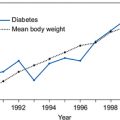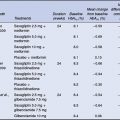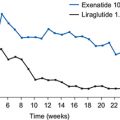Efficacy of bariatric surgery for the treatment of type 2 diabetes
Marked improvements in insulin sensitivity have been observed in bariatric patients within the first few days after gastric bypass procedures and before any weight loss has occurred (Rubino et al., 2010). In a recent meta-analysis of data from 621 studies involving more than 4000 patients with diabetes, complete resolution of diabetes (defined as normoglycaemia with no diabetes medications) occurred in 78.1% of patients (Buchwald et al., 2009). Among studies reporting resolution or improvement of diabetes, 86.6% of patients experienced either outcome. Table 8.1 shows the rates of diabetes resolution for the different bariatric procedures. In this meta-analysis, greater weight loss and shorter duration of diabetes also predicted remission of diabetes (Buchwald et al., 2009).
Despite the impressive nature of these data, only 4.7% of the studies were randomized controlled trials and none of the studies were designed specifically to examine the effects of bariatric surgery as a treatment for diabetes in patients with diabetes. Studies are now ongoing to determine if bariatric surgery, either gastric bypass or adjustable gastric banding, is more effective than intensive lifestyle modification to reduce weight and ultimately treat type 2 diabetes both in people with a body mass index (BMI) over 35 kg/m2 and in those with a BMI over 30 kg/m2. However, weight-loss surgery has yet to be compared with medical treatment for weight loss, or against standard medical treatment for diabetes in any randomized controlled trial with diabetes-specific end points. Any future trials should enrol varied patient populations both in terms of diabetes duration and severity, as well as according to age, sex and ethnicity, to determine who the most appropriate candidates for weight loss surgery are.
Stay updated, free articles. Join our Telegram channel

Full access? Get Clinical Tree







